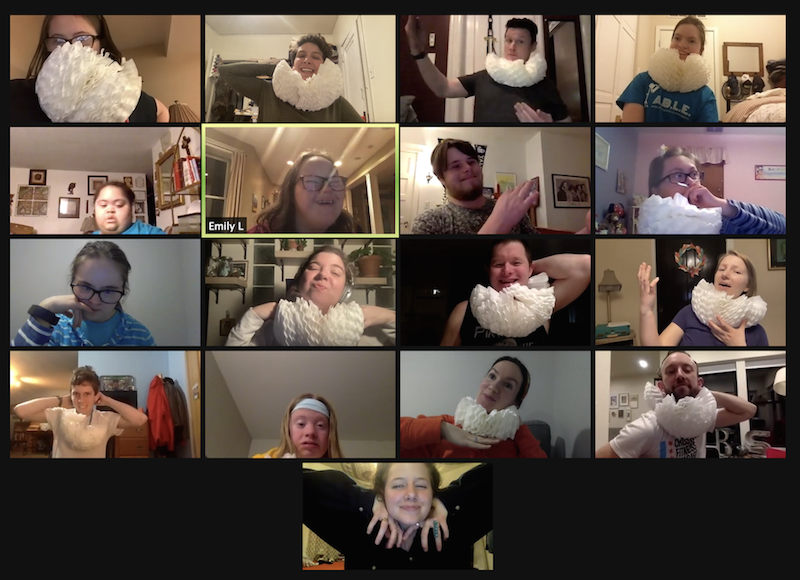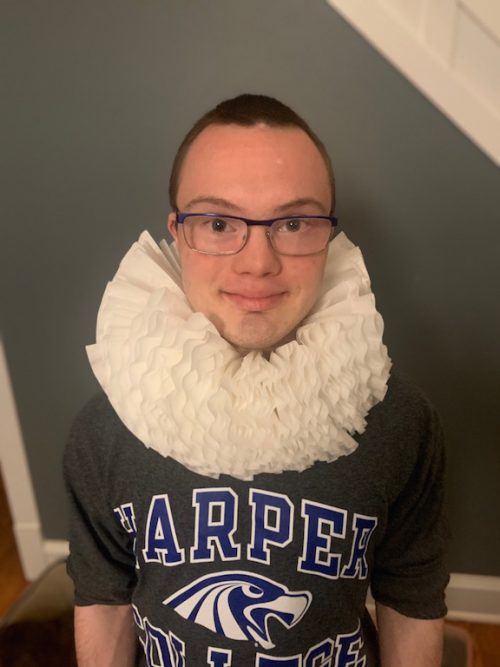
BY JUDY CARMACK BROSS
“Jack walked over to the statue, bowed to it, and very quietly said, ‘Mr. Shakespeare, I love working with you. Your plays are awesome and they make me a better actor. I’m happy to see you,’ ” describes A.B.L.E. (Artists Breaking Limits and Expectations) Founder and Executive Director, Katie Yohe, of her visit to watch her ensemble at Chicago Shakespeare Theatre before Navy Pier’s temporary closure. Jack Butler’s enthusiasm coming face to face with a bust of the bard is echoed in all of his fellow actors, the busiest troupe of Shakespeare interpreters in town right now.

Monday ensemble wears homemade Shakespearen ruffs, 2021.
Getting crafty during COVID, they’ve created Shakespearean ruffs out of coffee filters for the upcoming filming of Romeo & Juliet Remix, premiering on Zoom in May. The movie will weave original monologues, scenes, songs, and dances, developed by the cast, in with the existing text.
“A.B.L.E. believes that there are no ‘special needs,’ just human needs, and that disability is not a dirty word,” Yohe shares. “Each person needs different supports to be successful. We refer to our actors as having intellectual and developmental disabilities. Some people have Down syndrome, or autism, or Williams syndrome. These conditions are not ‘diseases’ or ‘afflictions’ or something someone ‘suffers with or from.’ ”

Katie Yohe warming up with ABLE, 2018. Photo by Liz Lauren.
Currently, A.B.L.E. hosts four ensembles, serving a total of 39 actors with intellectual and developmental disabilities ranging in age from 15 to 37. Yohe says, “To ensure all of our actors receive the individual attention and support they need to thrive, we strive to keep a two-to-one ratio of actors to support in each rehearsal. Two teaching artists plan curriculum, create materials, and lead each session. We currently have a roster of eight teaching artists who have backgrounds as performers, educators, and counselors.”
She continues, “They are supported by three to five volunteer facilitators in each class. Facilitators are an integral part of the ensemble: they model exercises and participate in activities side-by-side with our actors. Many of these volunteers are performers, but certainly not all. In 2020 our facilitators gave 1420 hours across all of our programs. We’ve had lawyers, educators, accountants, and even an airline pilot serve as facilitators. If they love and value the arts and are willing to play along, be silly, and build relationships, they are welcome to join us. We currently have 25 volunteer facilitators.”
While pursuing her BFA at Syracuse and dreaming of a Broadway career, Yohe was invited to volunteer for All Star Cast, a program for actors with Down syndrome. When she decided that a stage career was not for her, she put to work what she had learned from the All Star Cast members. She read about GIGI’s Playhouse in Chicago on Facebook, and in 2010 she created a teen drama troupe with six actors for the organization.
In 2016 A.B.L.E was born. Its ensembles produce an average of four theater performances yearly, including Shakespeare, Dickens, and Gilbert and Sullivan, as well as the group’s own original stories. A.B.L.E. partners with professional venues around the city to put on these productions.
Yohe says, “Growing up, the theatre is where I found my best friends. It’s where I’ve felt the most at ease but also the most energized and alive. It’s been the greatest privilege to lead ABLE and create a space where other people can find those same things.”
Virtual classes have worked well for their troupe, and A.B.L.E. was one of the first Chicago arts organizations to go virtual. The first Chicago school COVID outbreak closed Jackie Vaughn Occupational High School March 6. Of the 20 actors in one troupe, 13 were students there. A.B.L.E.’s ensembles were three weeks into rehearsals for their spring 2020 productions when shelter-in-place went into effect. Their teaching team pivoted quickly to move programming online, only missing one week of rehearsals. “Doing nothing was never an option,” Yohe explains. “I think people were just so thrilled to have something to do, and to keep a sense of normalcy and routine. This year has been like a crucible of all of our best theatre making skills: improvisation, teamwork, adaptability, listening. But we all wanted to be there and wanted to be together so we figured out a way. The resilience has been incredible.”

Emily Lavin participating in virtual class last year.
Yohe believes many members have actually blossomed working virtually, attributing that to the control it provides participants over their environment. She shares, “We have one actor who has chronic migraines. There are days when, if we were in person, she would have to stay at home and not participate. But because we’re online, she can participate from her bedroom. She can adjust the lights and the volume to a level that works for her. She can really work at her own pace and it doesn’t have to be all or nothing. We have another actor with selective mutism—she clams up when there are a bunch of eyes on her. But she’s at home in a familiar environment and she’s talking so much more online.”
Virtual sessions have also allowed for volunteers and participants outside of Chicago to have the chance to connect, with individuals Zooming in from nine different states. A.B.L.E. has also been able to reach new audiences online: its winter project, Anthology, had over 4,000 views from around the country and as far afield as New Zealand and Singapore.
Triumphs aside, Yohe says they’re still learning the best ways to work with this format. This adjustment has not been without questioning, trying and failing, and worry. But despite these significant challenges, A.B.L.E. has experienced record-breaking growth. And an abundance of bonding experiences, including its midweek dance parties. Every Wednesday night, members from all four ensembles sign in for a 30-minute dance party. Actors vote for a theme each week and suggest songs for the playlist. It’s half-an-hour of laughing, dancing, and lightness. This is all in keeping with the teaching team’s motto: Low pressure, high fun.

Sam Radinsky shows off his homemade ruff.
To help actors stay even more engaged with virtual sessions, A.B.L.E created custom story kits with visual aids, resources, and sensory supports. Actors also received things like coloring pages, word searches, and craft projects to stay active in between weekly sessions. For Anthology, audiences received kits so that they could interact with the stories that the A.B.L.E. ensembles created.
“Theatre is a collaborative art form,” Yohe explains. “As much as A.B.L.E. is a creative outlet, we are also social outlet. When you talk to our actors and ask them their favorite thing about rehearsal it’s always ‘being with my friends,’ ‘seeing my friends,’ or ‘doing xyz activity with this person.’ ”
The team works hard to develop practices that allow everyone to stand in the spotlight, regardless of things like literacy, short term memory, or communication style. “We believe everyone is ABLE to connect, to contribute, and to create. When you have a room full of people, whether it’s just your classmates, or it’s a full audience in a theatre, validating you and saying ‘we see you, we value you, we want whatever you have to give,’ that’s where the growth happens,” she says.

Alena Counter Brown and members of the ABLE at Chicago Shakespeare Theater in 2016. Photo by Michael Brosilow.
“During Alena’s first show with us stage at Chicago Shakespeare Theatre, she barely lifted her head up. I looped my arm through hers and had to walk with her from place to place on the stage. You could barely hear her. You would never guess that if you saw her now. When we did As You Like It in 2019, she got a mid-show standing ovation for the ‘All the world’s a stage’ monologue. She is so present and grounded and confident. She takes up space because she believes she deserves it. Her fellow ensemble members have given her the nickname ‘Sassy Beyonce,’ which tells you pretty much everything,” Yohe shares.
A.B.L.E has a partnership with Chicago Shakespeare Theatre at Navy Pier, performing on their stages, working with their education department, and taking field trips to see their productions. “I get questioned a lot about why I program Shakespeare for our ensembles,” Yohe explains. “We hear that Shakespeare is difficult to understand. That Shakespeare is challenging to work with. That only ‘certain’ people can work with Shakespeare, and that it needs to be done a certain way. But that’s not true. And people will say some of those same things about individuals with disabilities to argue that we can’t have inclusive education, or an inclusive workforce.”

Sean Okerberg swordfights with actor Samuel Floersheimer in CYRANO at Chicago Shakespeare Theater, 2018. Photo by Liz Lauren.
The A.B.L.E. ensemble breathes new life into these centuries-old plays: “Yes, these stories are 400 years old, and we’ve seen them all before. But how many times in those 400 years has an ensemble of 20 actors with Down syndrome performed As You Like It or Twelfth Night? For Romeo & Juliet Remix, we’ve given actors the option of either devising a scene or working with Shakespeare’s text. Over 80 percent of the ensemble wanted to do Shakespeare. And they are holding this story with such reverence.”
“We are subverting expectations about who theatre is for and who gets to tell what kind of stories and how the stories are told. By giving our ensemble members ownership over these classic roles that haven’t traditionally been ‘for’ them, we are doing two things: first, we’re showing that we respect our actors with disabilities and their talents, and second, we’re challenging our audiences to rethink how they see individuals with disabilities. And how they see these plays themselves. As Lucy Walsh, one of our actors, said, ‘I’m a serious actor and this is an important role for my resume.’ ”

Lucy Walsh in a physical theatre workshop with Frantic Assembly in 2018. Photo by Kaylie Honkala.
In addition to adding to their resumes, these experiences have a life-changing effect. As member Sam Radinsky explains, “I’ve grown up in A.B.L.E.—I am more mature. I can recognize my feelings and do breathing to calm me down. And I can be with my friends. I like to play characters that are different from myself. It’s fun to play characters that have a temper. It makes people uncomfortable, because they don’t expect that from me. And it feels amazing to show my feelings for everyone and to get them out. All the actors get to share their feelings onstage. My friend Matt joined A.B.L.E. I’ve known him for a really long time. And it’s fun to act with him because he wows me. He surprises me when he is serious, or sad as an actor.”

Group hug.
Yohe echoes this sentiment: “This work is all about relationship-building. And because we work with people for such a long time, we get to watch them grow and reach new goals and push themselves year after year. I love when a parent says ‘I never knew that about her’ or ‘I’ve never seen that side of him.’ Or when someone has a breakthrough in rehearsal and surprises us with something they’ve never done before.”
“At the end of each rehearsal,” Yohe says, “we ask participants to add roses or thorns, and ensemble member Claire O’Leary best summed it all up when she said: ‘Quarantine sucks. But my rose is being with all of my friends.’ ”

Katie Yohe and Claire O’Leary perform Twelfth Night at Chicago Shakespeare Theater (2016).
Radinsky adds, “A.B.L.E. is a family. The audience is our family too. We’re all making the play together. When new people see us who’ve never seen us before, I hope they think we can be friends, too. I hope an audience feels happy and proud of people in the ensemble. We should have a good life and feel happier.”
***
Next month A.B.L.E. will celebrate a huge milestone: its 5th anniversary as a 501c3. Looking to their next five years and beyond, they are inviting family, friends, and supporters to join in their High Five Crowdfunding Campaign, with a goal of $25,000 by May 4th. The campaign will launch on April 6th and will culminate with a virtual toast on May 4th at 7:00 pm CT on Facebook Live.
Tickets for Romeo & Juliet Remix go on sale May 18 for the live-streaming event on June 18. Visit the A.B.L.E. blog to go behind the scenes, check out their social media channels, and find out details on upcoming events, and even learn how to make your own Shakespearean ruffled collar by visiting ableensemble.com.







